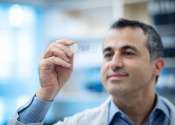Last update:
Psychology & Psychiatry
Neural signatures commonly observed when humans make choices can also reflect choice-independent processes
Past neuroscience research has identified patterns in neural activity typically observed when humans are engaged in value-based decision-making. This is the process through which humans choose between options that could be ...
18 hours ago
0
55
Neuroscience
A recurrent neural network-based framework to non-linearly model behaviorally relevant neural dynamics
A key objective of several neuroscience studies is to understand and model how the dynamics of distinct populations of neurons give rise to specific human and animal behaviors. Many existing methods for exploring the link ...
18 hours ago
0
51
Medical research news
Potential therapy target for cardiac arrhythmias found in SK2 channels
A new study by researchers at the University of Arizona College of Medicine–Phoenix and the University of California Davis Health identified a new target for developing a therapy to treat atrial fibrillation, the most common ...
21 hours ago
0
55

Federal government may be paying twice for care of veterans enrolled in Medicare Advantage plans
From 2011 to 2020, the Veterans Health Administration spent $78 billion to care for U.S. military veterans enrolled in Medicare Advantage plans, raising questions about federal overpayments to those private plans.
21 hours ago
0
7

Brain molecule reverses movement deficits of Parkinson's, offering new therapeutic target
A research team from the University of California, Irvine is the first to reveal that a molecule in the brain—ophthalmic acid—unexpectedly acts like a neurotransmitter similar to dopamine in regulating motor function, ...
Oct 4, 2024
0
71

PFAS exposure linked to sleep disruptions in young adults
Research led by the Keck School of Medicine of USC has shown that levels of "forever chemicals" in the blood are linked with disruptions to a fundamental pillar of health—sleep.
Oct 4, 2024
1
19

Pancreatic cancer tumor map uncovers notable differences between primary and metastatic disease
Indiana University Melvin and Bren Simon Comprehensive Cancer Center researchers have mapped pancreatic cancer tumor ecosystems using tissue from both the primary tumor, which is where cancer first starts to grow in the body, ...
Oct 4, 2024
0
27

Research points to potential new treatment for aggressive prostate cancer subtype
When researchers at the University of Michigan Rogel Cancer Center first identified a new subtype of aggressive prostate cancer, they knew they needed to understand how this genetic alteration was driving cancer and how to ...
Oct 4, 2024
0
6

COVID-19 human challenge study highlights small changes to memory and cognition
A new analysis from Imperial's human challenge study of COVID-19 has revealed subtle differences in the memory and cognition scores of healthy volunteers infected with SARS-CoV-2, which lasted up to a year after infection.
Oct 4, 2024
0
81

Gut bacteria engineered to act as tumor GPS for immunotherapies
Immunotherapeutic approaches have substantially improved the treatment of patients with advanced malignancies. However, most advanced and metastatic malignancies remain incurable and therefore represent a major unmet need.
Oct 4, 2024
0
22

Clinical trial finds new drug significantly extends lives of breast cancer patients
Patients with advanced HER2-positive breast cancer very often develop brain metastases. When this happens, patients have low chances of surviving the next few years with existing therapies such as surgery and radiotherapy. ...
Oct 4, 2024
0
31

Study unveils the role of gamma-delta T cells in cancer immunology
A new study published in Cell Reports Medicine reveals critical insights into the role of gamma-delta T cells across 33 cancer types, shedding light on their potential as clinical biomarkers and therapeutic targets in cancer ...
Oct 4, 2024
0
23

DNA molecules with 'invisibility cloak' sequences can selectively target diseased cells in motor neuron disease
Researchers at the Francis Crick Institute and the UCL Queen Square Institute of Neurology have developed DNA molecules which contain "invisibility cloak" sequences, preventing healthy cells from reading the messages they ...
Oct 4, 2024
0
22

Shedding light on alcohol's long shadow among pregnant and parenting women
The woman came in crying. She was disheveled and pregnant, and appeared to be intoxicated. She had a 5-year-old girl in tow and was looking for help from the crisis center where Anna Shchetinina volunteered.
Oct 4, 2024
0
4

Study finds no uniform brain shrinkage pattern in Alzheimer's
The way in which brains shrink in those who develop Alzheimer's disease follows no specific or uniform pattern, finds a new study by researchers at UCL and Radboud University in the Netherlands.
Oct 4, 2024
0
1

Molecular map points the way toward better food choices
"Gut health" is a growing buzzword for foodies and dietitians alike—and with good reason. The trillions of microbes and bacteria living in our gut are implicated in numerous aspects of health and disease.
Oct 4, 2024
0
16

Are auditory magic tricks possible for a blind audience?
Magic tricks make the impossible seem possible. Magicians have long captivated audiences with visual tricks, such as pulling a bunny from a hat or sawing someone in half, but tricks that rely on sound are scarce.
Oct 4, 2024
0
11

Comprehensive mapping of genetic activity brings hope to patients with chronic pain
Researchers at Karolinska Institutet have developed a new comprehensive mapping of genetic activity for understanding the causes of chronic pain. The study, published in Nature Communications, opens the way to more efficient ...
Oct 4, 2024
0
2

Older e-cigarette users face increased odds of respiratory issues, study finds
A study by doctoral student Adriana Eugene and Distinguished Professor Luisa N. Borrell found that older adults who use electronic cigarettes had greater odds of reporting respiratory illness such as asthma, chronic bronchitis, ...
Oct 4, 2024
0
20

Dietary fat alone does not cause changes in the hypothalamus, mouse study finds
A high-fat diet can promote overweight and increase the risk of metabolic diseases, such as diabetes. In mice brains, this leads to measurable changes in the region of the hypothalamus. However, fat alone does not appear ...
Oct 4, 2024
0
0








































